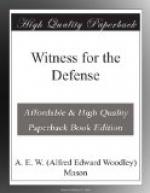“She goes to bed, she undresses and goes to bed—she must do that if she is to escape—she puts out her light, she lies in the dark awake, and under the same roof, close to her, in the dark too, is lying the man she has killed. Just a short passage separates her from him. There are no doors—mind that, Mr. Thresk—no doors to lock and bolt, merely a grass screen which you could lift with your forefinger. Wouldn’t any and every one of the little cracks and sounds and breathings, of which the quietest and stillest night is full, sound to her like the approach of the dead man? The faintest breath of air would seem a draught made by the swinging of the grass-curtain as it was stealthily lifted—lifted by the dead man. No, Mr. Thresk. The wife is just the one person I could imagine who would do that needless barbarous violence of dragging the body into the open—and she would do it, not out of cruelty, but because she must or go mad.”
Thresk listened without a movement until Robert Pettifer had finished. Then he said:
“You know Mrs. Ballantyne. Has she the strength which she must have had to drag a heavy man across the carpet of a tent and fling him outside?”
“Not now, not before. But just at the moment? You argued, Mr. Thresk, that it is impossible to foresee what people will do under the immediate knowledge that they have committed a capital crime. I agree. But I go a little further. I say that they will also exhibit a physical strength with which it would be otherwise impossible to credit them. Fear lends it to them.”
“Yes,” Thresk interrupted quickly, “but don’t you see, Mr. Pettifer, that you are implying the existence of an emotion in Mrs. Ballantyne which the facts prove her to have been without—fear, panic? She was found quietly asleep in her bed by the ayah when she came to call her in the morning. There’s no doubt of that. The ayah was never for a moment shaken upon that point. The pyschology of crime is a curious and surprising study, Mr. Pettifer, but I know of no case where terror has acted as a sleeping-draught.”
Mr. Pettifer smiled and turned altogether away from the question.
“It is, as I said, a minor point, and perhaps one from which any sort of inference would be unsafe. It interested me. I lay no great stress upon it.”
He dismissed the point carelessly, to the momentary amusement of Henry Thresk. The art of slipping away from defeat had been practised with greater skill. Thresk lost some part of his apprehension but none of his watchfulness.
“Now, however, we come to something very different,” said Pettifer, hitching himself a little closer to his table and fixing his eyes upon Thresk. “The case for the prosecution ran like this: Stephen Ballantyne was, though a man of great ability, a secret drunkard who humiliated his wife in public and beat her in private. She went in terror of him. She bore on more than one occasion the marks of his violence; and upon that night in Chitipur, perhaps in a panic and very likely under extreme provocation, she snatched up her rook-rifle and put an end to the whole bad business.”




